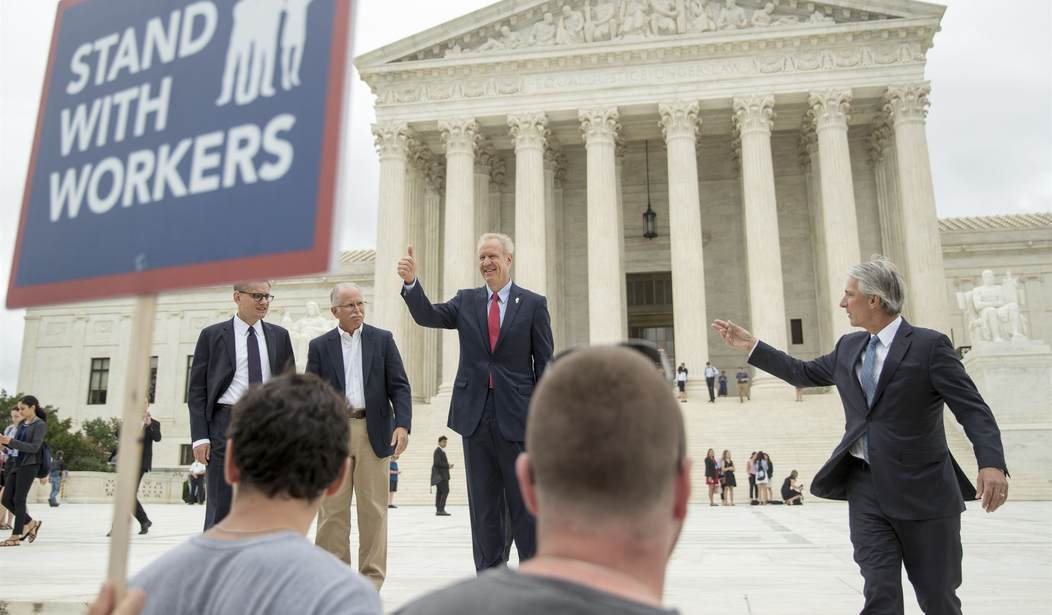Rusty Brown is the Southern Director of the Freedom Foundation.
On paper, the U.S. Supreme Court’s landmark 2018 ruling in Janus v. AFSCME banned mandatory union membership and dues in the public workforce. But in the years since it was issued, lower courts have demonstrated little stomach for enforcing the decision, emboldening union leaders to simply behave as though it never happened.
That could change soon, as several cases that could put some teeth in Janus are currently under consideration by the current justices. In the meantime, however, at least four states — Florida, Kentucky, Tennessee, and Oklahoma — are moving ahead with measures intended to enforce exactly what the ruling says.
In Florida, Republicans in the state Legislature are working to exploit supermajorities in both houses in order to enact a bill whose language mirrors that of the Janus ruling, with a few extra surprises thrown in for good measure.
Since first being heard on March 7, the Senate version has cleared its second and final committee with the next stop being the Senate floor. The House bill cleared its first committee on March 16 and has one more committee hearing before proceeding to the house floor and, finally, the governor’s desk.
Meanwhile, in Kentucky, a pair of bills moving through the General Assembly would also take the state out of the dues-collection business.
Senate Bill 7 would stop automatic transfers to political action committees from a public employee’s paycheck. House Bill 364 would do the same, in addition to preventing payroll deductions for union membership dues.
House Bill 26 would prohibit public funds from being used by unions for lobbying purposes. In essence, it simply imposes rules that prevent the government from lobbying itself.
Both Kentucky bills have passed through committee and await floor action in their respective chambers.
A recent study revealed that the Kentucky Education Association directs nearly $4 out of every $10 in union dues collected from its members to the National Education Association (NEA), which uses these funds to support partisan liberal political organizations and activities.
As the final version of SB 7 is decided, lawmakers plan to strengthen the bill with an amendment that does what the Florida bill would already do — end all government involvement in transmitting funds directly to unions, including payroll deductions for membership dues.
Next door in Tennessee, a bill authored by Republican Senate Leader Jack Johnson (R-Franklin) requires the Tennessee Department of Education to “publish the annual state salary schedule” on the department website, but an amendment to the bill adds a requirement that would also prohibit union dues from being deducted from teachers’ salaries.
The amendment explicitly prohibits any Local Education Agency (LEA) from deducting dues from an employee’s payroll for any “professional employees’ organization,” or union. Instead, it would be up to the individual employee to pay those voluntarily.
“This section does not prohibit an employee of an LEA from personally and voluntarily remitting dues to a professional employees’ organization,” the bill notes.
Lastly, Oklahoma is also considering a bill that would require union members to opt-in to unions on an annual basis rather than the status quo of being permanently opted in until they request to be let out. Senate Bill 99 builds upon a 2022 Executive order signed by the governor that required teachers be notified that they have a constitutional right not to participate in a union if they choose not to for any reason.
Union caterwauling notwithstanding, nothing being proposed in either state would prevent workers from forming or belonging to a union if they so choose. The legislation would simply make unions responsible for their own dues deductions.
Moreover, while the Florida, Kentucky, Tennessee, and Oklahoma proposals all include provisions not specifically mentioned in the Janus ruling as written by Justice Samuel Alito and affirmed by four of his colleagues, each is entirely consistent with its unambiguous intent.
The ruling clearly states, “Neither an agency fee nor any other payment to the union may be deducted from a nonmember’s wages, nor may any other attempt be made to collect such a payment, unless the employee affirmatively consents to pay.”
What better way to ensure public employees do, in fact, agree to support their union than by making them directly responsible for paying dues rather than allowing the state to deduct it preemptively at the union’s behest?
When unions are allowed to outsource their own billing and collection activities to a taxpayer-supported state agency, pretty soon it starts to feel like the money belongs to them instead of the worker who earned it.
It’s time unions were reminded which side is working for the other.














Join the conversation as a VIP Member